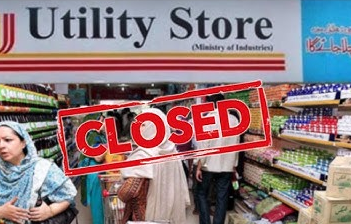USC Closes All Outlets Nationwide Following Government Orders
The Utility Stores Corporation (USC) has officially ended its retail operations across Pakistan, closing more than 4,000 outlets that had long provided subsidized goods to low-income families. The closure, effective July 31, follows directives from Prime Minister Shehbaz Sharif and decisions taken by USC’s board earlier this month.
USC, a state-owned enterprise (SOE) established in 1971, was originally created to ensure the availability of basic commodities at affordable prices. But after years of financial instability, mounting losses, and persistent operational issues, the government has finally shut it down for good.
Sales Halted, Systems Disabled
According to internal notifications seen by Dawn.com, all sales and procurement activities at USC outlets have ceased. While inventories are being returned to vendors or shifted to storage, no further transactions are permitted. The business management software, Odoo, used by USC to manage operations, has also been permanently deactivated for sales purposes.
“Any use of the Odoo system for purchases or sales beyond July 31 will be considered a serious breach of policy,” reads the notification. The platform will now serve solely for reconciling stock and maintaining records.
Store managers and staff have been explicitly warned: conducting unauthorized transactions through the system will trigger disciplinary action under USC rules.
Years of Losses and a Slow Demise
The final blow comes after a long decline. According to the Finance Ministry’s recent performance report on SOEs, USC racked up Rs4.1 billion in losses in the first half of FY25 alone. Its total cumulative losses now sit at Rs15.5 billion.
These financial troubles are not new. In January, the federal cabinet created a task force to oversee the organization’s shutdown. By April, more than 1,200 stores had already been shuttered, and over 2,200 employees were laid off as part of a broader restructuring effort. The plan also involves placing permanent staff into the federal government’s surplus employee pool or absorbing them into other departments.
A Symbol of Subsidized Support—Now History
For decades, USC symbolized the state’s effort to cushion the economic blow for lower-income citizens by offering essentials like flour, sugar, and oil at reduced prices. However, chronic mismanagement, poor oversight, and an outdated operating model turned it into a financial burden rather than a safety net.
As the government now moves to tighten fiscal discipline and restructure loss-making enterprises, USC becomes one of the most visible casualties of that shift.
Its closure marks the end of an era—and a significant moment in Pakistan’s ongoing effort to trim state involvement in commercial ventures that no longer deliver public value.

